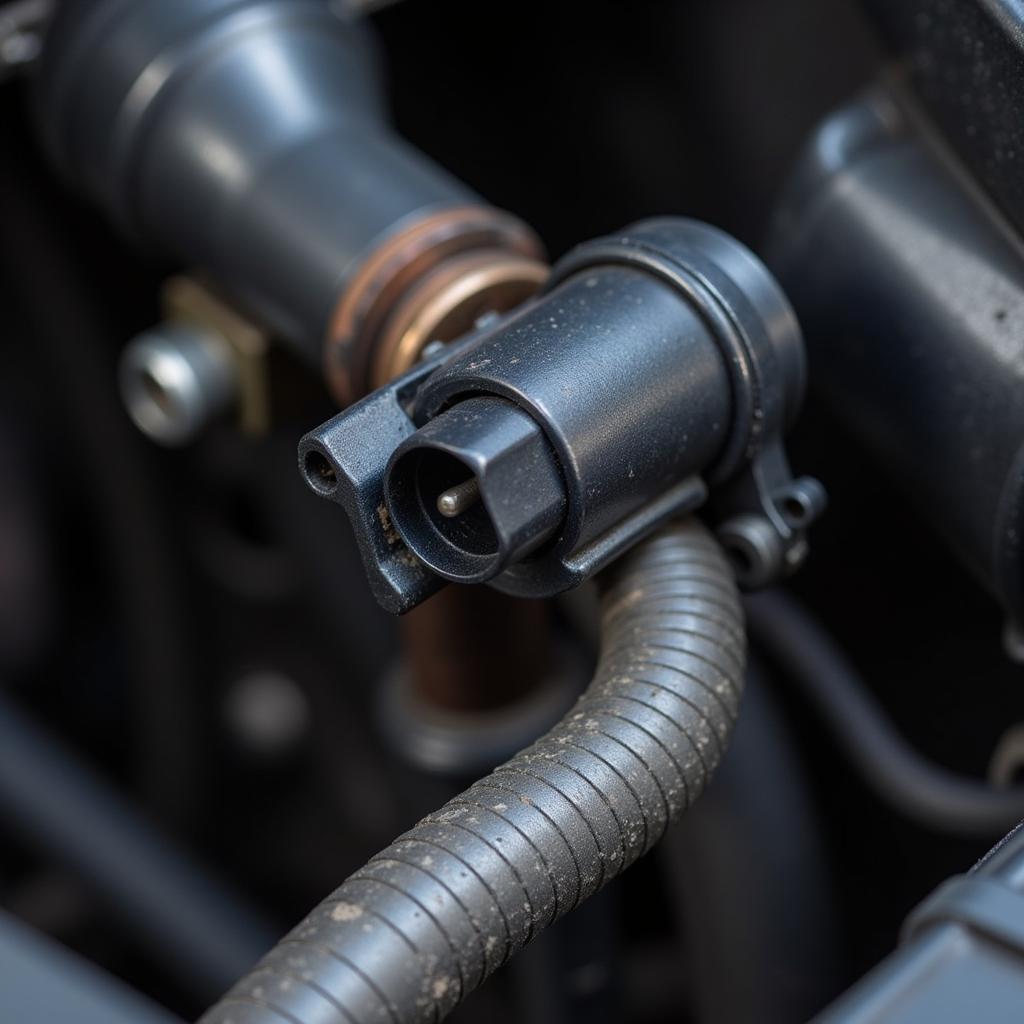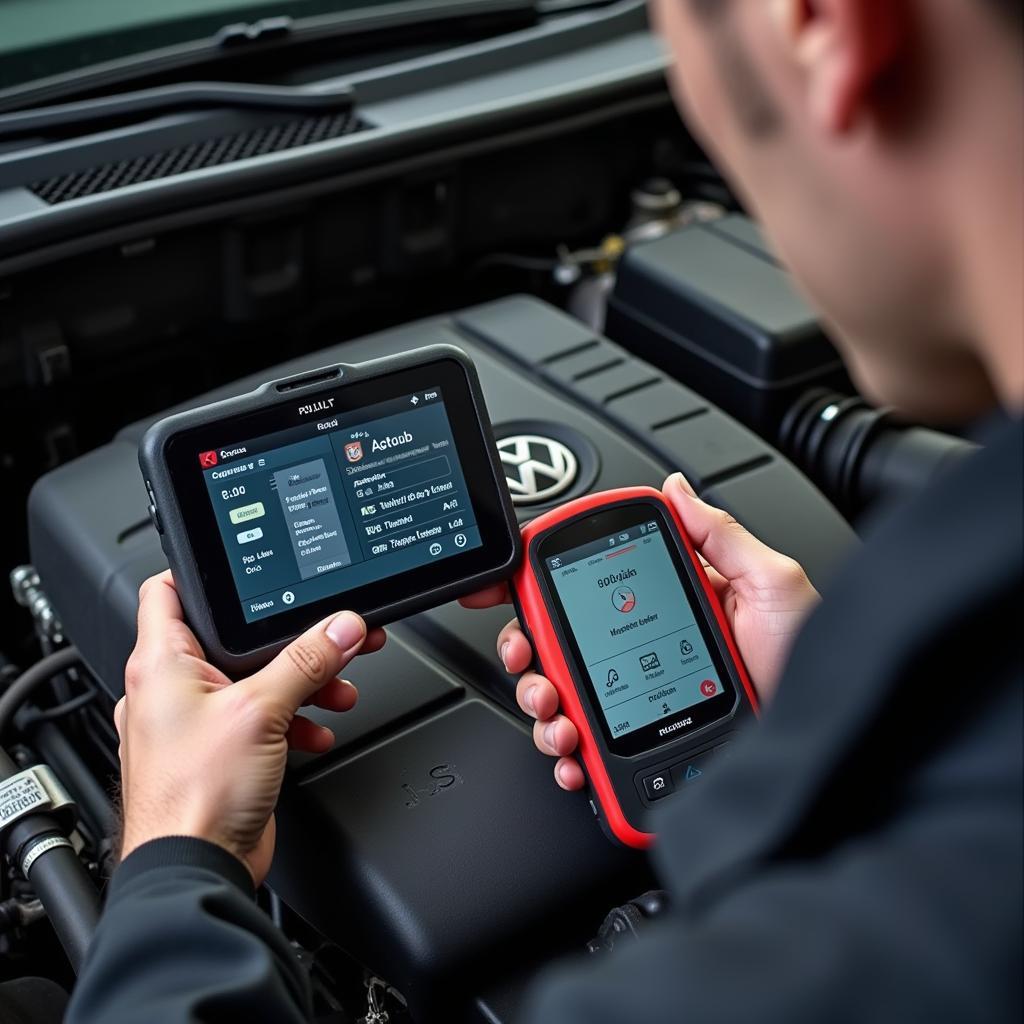Your cart is currently empty!

Understanding and Fixing VW Fault Code P0171
The dreaded check engine light – a beacon of automotive uncertainty that can strike fear into the hearts of even the most seasoned drivers. When this unwelcome guest appears on your dashboard, often accompanied by noticeable performance issues, it’s a clear sign that something is amiss under the hood. In the world of Volkswagen vehicles, one of the most common culprits behind this automotive distress signal is the enigmatic fault code P0171. This code, signaling a “System Too Lean Bank 1” condition, can be a real head-scratcher for VW owners.
But fear not, intrepid motorist! This article delves into the intricacies of the VW fault code P0171, providing a comprehensive guide to understanding its causes, recognizing its symptoms, and most importantly, addressing the issue head-on. Whether you’re a DIY enthusiast eager to tackle the problem yourself or prefer the expertise of a trusted mechanic, this guide will equip you with the knowledge to navigate the P0171 code like a seasoned automotive expert.
What Does “System Too Lean Bank 1” Mean?
Before we dive into the nitty-gritty of troubleshooting, let’s demystify the technical jargon. “System Too Lean Bank 1” essentially means that the engine’s computer, the Engine Control Module (ECM), is detecting an imbalance in the air-fuel mixture entering the combustion chamber. In simpler terms, your engine is getting too much air and not enough fuel – a recipe for poor performance and potential engine damage. The “Bank 1” part of the code specifies the side of the engine where the imbalance is occurring. Most VW engines have two cylinder banks, and “Bank 1” typically refers to the side containing cylinder #1.
Common Causes of P0171 in VW Vehicles
Understanding the potential culprits behind the P0171 code is crucial for effective diagnosis and repair. Here’s a closer look at the usual suspects in VW vehicles:
1. Vacuum Leaks:
Think of your engine as a well-choreographed dance floor where air and fuel waltz together in perfect harmony. Now, imagine a rogue tear in the dance floor (or in this case, a leak in the intake system). The air, being the mischievous dancer it is, sneaks in through this unintended entrance, disrupting the delicate air-fuel balance and triggering the P0171 code. Vacuum leaks can occur in various areas, including:
- Intake Manifold Gasket: A common culprit, especially in older VWs, is a worn-out intake manifold gasket. This gasket acts as a seal between the intake manifold and the engine block, and any leaks can introduce unmetered air into the mix.
- Vacuum Hoses: These rubber hoses, responsible for channeling vacuum pressure to various engine components, can become cracked, brittle, or disconnected over time, leading to – you guessed it – vacuum leaks.
- PCV Valve and Hose: The Positive Crankcase Ventilation (PCV) system plays a vital role in removing harmful blow-by gases from the crankcase. A faulty PCV valve or a leaking PCV hose can disrupt the air-fuel ratio.
2. Oxygen Sensor Malfunction:
The oxygen sensors, or O2 sensors, are the unsung heroes of your VW’s emission control system. These sensors, located in the exhaust stream, continuously monitor the oxygen content in the exhaust gases, providing crucial feedback to the ECM to fine-tune the air-fuel mixture. A malfunctioning oxygen sensor can send inaccurate readings to the ECM, leading to an overly lean condition and the dreaded P0171 code.
 VW Oxygen Sensor
VW Oxygen Sensor
3. Fuel System Issues:
As the name suggests, fuel system problems directly impact the engine’s ability to receive the right amount of fuel. Some common fuel-related culprits include:
- Clogged Fuel Filter: A clogged fuel filter restricts fuel flow to the engine, starving it of the necessary fuel for optimal combustion.
- Weak Fuel Pump: The fuel pump is responsible for drawing fuel from the tank and delivering it to the engine. A weak fuel pump struggles to maintain adequate fuel pressure, resulting in a lean condition.
- Malfunctioning Fuel Injectors: Fuel injectors are the gatekeepers of the fuel delivery system, spraying a precise amount of fuel into the combustion chamber. Clogged, dirty, or faulty injectors can disrupt the fuel spray pattern, leading to an improper air-fuel mixture.
4. Mass Air Flow (MAF) Sensor Problems:
The MAF sensor, another crucial player in the air-fuel ratio game, measures the amount of air entering the engine. Based on this information, the ECM calculates the appropriate amount of fuel to inject. A dirty or faulty MAF sensor can send incorrect air flow readings to the ECM, causing it to miscalculate the fuel delivery and resulting in a lean condition.
Recognizing the Symptoms of P0171
Aside from the ever-so-helpful check engine light, your VW might exhibit some telltale signs that something is amiss with the air-fuel mixture. Keep an eye out for these symptoms:
- Rough Idle: When your VW’s engine is idling, it should purr like a contented cat. However, a lean condition can cause a rough or erratic idle, making it feel like your car is about to stall.
- Hesitation or Stumbling During Acceleration: You know that feeling when you press down on the gas pedal, expecting smooth acceleration, but instead, your car hesitates or stumbles? This is a classic symptom of a lean condition, where the engine struggles to get enough fuel for a quick burst of power.
- Reduced Fuel Economy: While we all dream of a magical fuel-saving device, a sudden and unexplained decrease in fuel economy can be a sign of a lean condition.
- Engine Misfires: In more severe cases, a lean condition can cause engine misfires. These misfires occur when the air-fuel mixture in the combustion chamber fails to ignite properly, resulting in a noticeable jerking or sputtering sensation.
Diagnosing and Fixing VW Fault Code P0171
Now that you’re familiar with the potential culprits and their telltale signs, let’s explore how to diagnose and fix the P0171 code.
1. Check for Vacuum Leaks:
- Visual Inspection: Start by visually inspecting all the vacuum hoses connected to the intake manifold, throttle body, and PCV system. Look for any cracks, loose connections, or signs of damage.
- Carb Cleaner Test: If you suspect a vacuum leak but can’t pinpoint it visually, try using carb cleaner. With the engine idling, carefully spray carb cleaner around suspect areas. If the engine RPM changes, you’ve likely found your leak.
2. Inspect the Oxygen Sensors:
- Visual Check: While not always conclusive, a visual check of the oxygen sensors can sometimes reveal obvious damage or excessive carbon buildup.
- Scanner Diagnosis: A more reliable method is to use an OBD-II scanner to check the oxygen sensor readings. A sluggish or unresponsive sensor is a likely indicator of a problem.
3. Address Fuel System Issues:
- Fuel Filter Replacement: Replacing the fuel filter is a good preventative maintenance practice and can often resolve fuel delivery issues.
- Fuel Pressure Test: A fuel pressure test, usually performed with a pressure gauge, can determine if the fuel pump is delivering adequate pressure.
- Fuel Injector Cleaning or Replacement: Cleaning or replacing clogged or faulty fuel injectors can restore proper fuel delivery.
 Mechanic Inspecting a VW Engine
Mechanic Inspecting a VW Engine
4. Clean or Replace the MAF Sensor:
- Cleaning the MAF Sensor: Carefully remove the MAF sensor from the air intake duct and use a specialized MAF sensor cleaner to remove any dirt or debris.
- MAF Sensor Replacement: If cleaning doesn’t resolve the issue, the MAF sensor might need replacement.
5. Seek Professional Help:
If you’re not comfortable tackling these repairs yourself, or if the problem persists despite your best efforts, it’s best to seek the expertise of a qualified VW mechanic. They have the experience, knowledge, and specialized tools to diagnose and resolve the P0171 code effectively.
Don’t Let P0171 Rain on Your Parade
The VW fault code P0171, while a common occurrence, doesn’t have to be a cause for panic. By understanding its causes, recognizing its symptoms, and following the diagnostic steps outlined in this guide, you can address the issue head-on and restore your VW’s performance to its former glory.
Need expert assistance with your VW’s P0171 code or other automotive needs? Contact VCDStool at +1 (641) 206-8880 and our email address: vcdstool@gmail.com or visit our office located at 6719 W 70th Ave, Arvada, CO 80003, USA. We’re here to help you get back on the road with confidence.
FAQs about VW Fault Code P0171
1. Can I still drive my VW with the P0171 code?
While it’s possible to drive short distances with the P0171 code, it’s not recommended. Driving with a lean condition can lead to reduced engine performance, decreased fuel economy, and potential engine damage.
2. How much does it cost to fix the P0171 code?
The cost of repair varies depending on the underlying cause and the labor rates in your area. Simple fixes, like replacing a vacuum hose, can be relatively inexpensive. However, more complex repairs, such as replacing a fuel pump or oxygen sensors, can be more costly.
3. Can a bad gas cap cause the P0171 code?
While a loose or damaged gas cap can trigger the check engine light, it’s unlikely to cause the P0171 code directly. The gas cap is part of the evaporative emissions system (EVAP), which is separate from the air-fuel mixture control system.
4. Will clearing the P0171 code fix the problem?
Clearing the code with an OBD-II scanner might temporarily extinguish the check engine light, but it won’t address the underlying issue. If the problem persists, the code will return.
5. Are certain VW models more prone to the P0171 code?
While the P0171 code can occur in any VW model, some models might be more susceptible to specific causes. For instance, older models with higher mileage might be more prone to vacuum leaks due to aging hoses and gaskets. You can find more information about specific VW models and their common fault codes on our website. For example, you can check out the fault codes for the 2012 VW CC, 2000 VW Eurovan Rialta, or the PCV code for the VW Jetta 2.5. We also offer a wide selection of diagnostic tools, including a wireless auto code reader specifically designed for VW and Audi vehicles.
6. How can I prevent the P0171 code in the future?
Regular maintenance, including replacing air and fuel filters, inspecting vacuum hoses, and addressing potential issues promptly, can significantly reduce the likelihood of encountering the P0171 code. Using high-quality fuel and avoiding prolonged idling can also contribute to a healthy engine and a happy check engine light.
by
Tags:
Leave a Reply